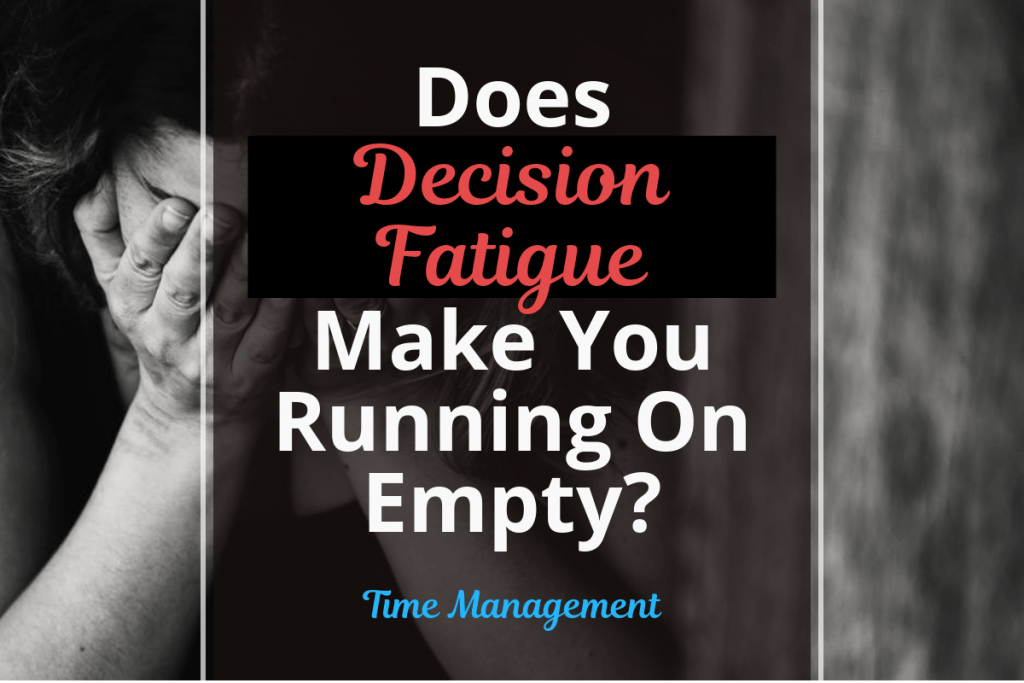🖊 This article was last updated on September 29, 2019
Earlier this morning, you were a powerhouse of effective decision making, amazing productivity, boundless energy, and motivation. It’s after four in the afternoon now, and you just had a small, but still quite impressive, nervous breakdown when someone asked you what you wanted in your coffee. You have reached decision fatigue; without consciously being aware of it, your brain has shut down all rational thinking processes and turned off your mental ability to make any more balanced decisions. Now what?

Decision Fatigue Explained
Decision fatigue may seem to happen suddenly and without warning, but your mind’s decision-making capacity had already been slowing down for hours prior to the coffee incident. Your brain’s reaction to long hours of making choices is to slowly lose the ability to use rational thought in making important decisions.
Decision-making fatigue is a well-researched phenomenon that many of us already experienced long before Roy F. Baumeister, a social psychologist, gave it a name. It’s the reason we signed up for an extended warranty on a product that cost less than the warranty itself, why we chose doughnuts instead of a nutritional snack, and the reason you bought season tickets for a sport you actually don’t like.
When the brain reaches its decision-making limit, it convinces us to take the path of least resistance. These decisions are often the result of not having the mental stamina to argue with anyone, not thinking clearly, and making a careless decision just to get it out of the way.
Decision fatigue is different from physical fatigue, but it may be influenced by exhaustion too. It is characterized by poor choices generally made later in the day, in both business and personal situations. It results in:
- Analysis paralysis: The inability to make any choice at all.
- Impulsive purchases: Suffering decision fatigue drains us of our rational thought processes, altering our perceptions of reality. For instance, buying your child a pony seemed like a great idea at the time; too bad you live in an apartment…
- Inability to exercise self-control: Willpower is one of the first things to go when your brain begins to shut off rational decision making.
- Poor decision making: Your ability to make a balanced decision will be impaired once you have reached the stage of decision fatigue.
- Inability to stand your ground: Hand in hand with poor decision making, the inability to stand your ground means that you will “give in,” regardless of what you personally believe. Your brain will choose the shortcut or the path of least resistance.

Combatting Decision Fatigue
Even the simplest decisions we make daily will fuel decision making fatigue, so streamlining less important choices will make a difference in our ability to combat it. Successful entrepreneurs know that choosing an outfit in the morning can drain decision making energies; that’s why many of them wear the same clothing every day. Other ways to combat decision fatigue include:
- Take a few breaks to recharge: Get up and change your environment for a few minutes, several times a day. The Pomodoro Technique is great for this.
- Task batching: Combine your tasks into blocks so that you are not constantly using brain power to switch back and forth between them. You can make decisions about your tasks one block at a time.
- Make important decisions in the morning: Any big decision should be made in the morning, before your decision-making energies are tapped out. This JAMA study links time of day with deteriorating decision-making skills for doctors and judges (this is scary stuff).
- Get sleep: Sleep matters for your brain to be fully rested and functional. A better night’s sleep allows your brain to stay focused longer throughout the day.
- Limit the options: For every decision, there are a few options that are simply not going to be appropriate. Eliminating these allows you to stay focused only on the most viable options.
- Make the decision final: Once a choice is made, don’t go back to revisit other options. Make your decision and implement it immediately.
- Eat a healthy snack: One way to combat decision fatigue is to snack on something with a bit of glucose. Glucose (natural sugars) are quite literally “brain food,” and may help give you a temporary mental boost.
- Do your research in advance of the decision: If a decision will be a planned one, such as a car purchase or changing vendors, take the time to do a little research in preparation for the choices (But beware of Analysis Paralysis).
- Make inconsequential choices before you face your day: Remember, even the smallest choices will add up to wipe out your decision-making energy. Pack your lunch, lay the next day’s clothes out, and make a to-do list of priorities for the next day.
- Be aware of when you are tapped out: Irritability, putting off decisions, seeking distraction, or looking for a “temporary fix” of a permanent problem are all signs that your decision-making energy tanks are on empty.
Conclusion
In a structured work environment, bosses can delegate tasks to all coworkers in the office. As an entrepreneur, it may be just you and your computer throughout the entire working day. A smaller staff certainly doesn’t mean fewer decisions, though. You can expect that at some point during your day, you may experience decision fatigue; don’t be afraid to shut down the computer and call it a day if you do (before you end up with a pony in your apartment).
- These Black Friday deals will skyrocket your productivity (2021 edition) - November 11, 2021
- How to Stay Productive as a Digital Nomad - December 23, 2019
- When is the right time to outsource? - December 3, 2019

